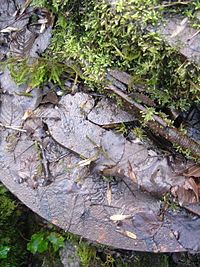Old Iron Works, Mells facts for kids
| Site of Special Scientific Interest | |
 |
|
| Area of Search | Somerset |
|---|---|
| Coordinates | 51°14′16″N 2°22′36″W / 51.23777°N 2.37667°W |
| Interest | Industrial Archaeology, Biological |
| Area | 0.25 hectares (0.62 acres) |
| Notification | 1987 |
The Old Iron Works, Mells (also known as Fussells' Lower Works) is a special place in the Wadbury Valley. It's found south of Mells village in Somerset, England. This site is quite small, about the size of half a football field. It was officially recognized in 1987.
This old factory is now a Site of Special Scientific Interest. This means it's protected because it's important for both nature and history. It's a ruined iron works that used to make tools for farming. These tools were sent all over the world! Today, it's a very important place for horseshoe bats to have their babies. The main buildings near the entrance are listed as Grade II*. This means they are very old and important. Most of the rest of the site is a Scheduled Ancient Monument. This gives it even more protection. The site is also on the Heritage at Risk Register. This list helps make sure important historical places get the care they need.
Contents
Home to Special Bats
This site is a vital home for two types of bats. These are the Greater and Lesser Horseshoe Bats. Bats are amazing creatures that fly at night.
Breeding and Hibernation
Before the 1980s, one of the old factory buildings had a roof space. Many Greater Horseshoe bats used this space to raise their young in summer. Smaller numbers of Lesser Horseshoe bats also used it. When winter comes, bats need a safe place to sleep. At the Old Iron Works, they use old tunnels and flues in a low cliff. These dark, quiet spots are perfect for them to hibernate.
The Story of the Iron Works
People believe there was an iron factory here since about the year 1500. Back then, Mells was even called Iron Burgh. Records show that people were working with iron in this area as early as the 1200s.
The Fussell Family Business
In 1744, a man named James Fussell III leased the land. He wanted to build mills to grind tools and forge iron plates. His son, James Fussell IV, made the business even bigger. At one time, 250 people worked at this site! The Fussell family ran six different iron works in the area. These included the Upper Works and sites in Great Elm, Chantry, Railford, and Gurney Slade.
The tools made by Fussells were sent to places like Europe and America. The family also started other businesses. They got involved in coal mining and even had their own banknotes!
Why the Works Closed Down
The business started to struggle in the late 1800s. One reason was that they were slow to switch from water power to steam power. Also, farming in England faced big problems in the 1870s. This meant fewer people needed farming tools. By 1895, they stopped making tools. The company finally closed down in 1900.
Where to See More
Many old photos, diagrams, plans, and tools from the Fussell family are still around. You can see them on display at the Frome Museum.
 | Claudette Colvin |
 | Myrlie Evers-Williams |
 | Alberta Odell Jones |

